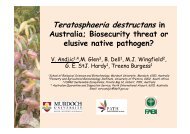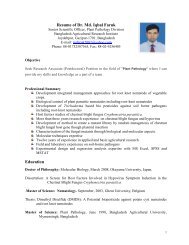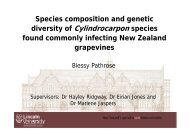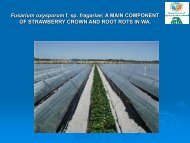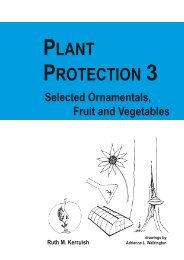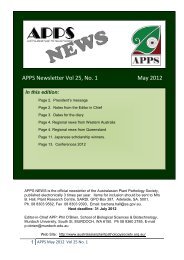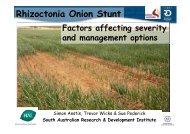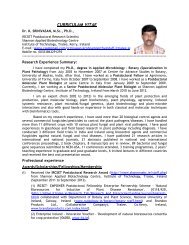invit - Australasian Plant Pathology Society
invit - Australasian Plant Pathology Society
invit - Australasian Plant Pathology Society
You also want an ePaper? Increase the reach of your titles
YUMPU automatically turns print PDFs into web optimized ePapers that Google loves.
KEYNOTE SPEAKERS<br />
Dr Robin Oliver is a Technical Manager in Syngenta’s Product Safety organisation and has technical<br />
responsibility for environmental fate and behaviour studies. He completed a PhD in Agricultural<br />
Chemistry at Glasgow University and has 20 years experience in plant and soil metabolism. Research<br />
interests include degradation by anaerobes, phototrophs and indirect photolysis.<br />
Dr Timothy Paulitz is a research plant pathologist with the USDA Agriculture Research Service in<br />
Pullman, WA, USA. He investigates root diseases and soilborne pathogens of wheat, barley, Brassicas<br />
and other rotation crops, with an emphasis on Rhizoctonia, Pythium, and Fusarium. He has focused on<br />
the ecology, epidemiology, spatial analysis and molecular detection and quantification of soilborne<br />
pathogens, and the development of cultural management techniques for root diseases, especially in<br />
direct-seed systems.<br />
Dr. Sabine Ravnskov is employed as Associate Professor at Aarhus University, covering research in<br />
and teaching of microbial interactions in soil and roots with special emphasis on arbuscular mycorrhiza<br />
(AM) and pathogen interactions in relation to plant health. Main approach in her fundamental research is<br />
to reveal mechanisms behind the antagonistic potential of AM fungi against plant pathogens, and to<br />
study functional compatibility between plant and fungus in AM symbioses. Dr. Ravnskovs more applied<br />
research profile focus on biological plant disease management<br />
INVITED SPEAKERS<br />
Professor Lyn Abbott’s research focuses on soil biology in sustainable agricultural systems as well as<br />
disturbed natural ecosystems. She has had a long-term interest in research that increases the efficiency<br />
of fertiliser use in farming systems and the role of soil biological processes in restoration of disturbed<br />
environments. This includes understanding the roles of arbuscular mycorrhizal fungi, the use of soil<br />
amendments such as biochar, biosolids, compost and clay to enhance soil biological fertility, indicators<br />
of soil quality, and microbial dynamics in soil. She has run many soil biology workshops for farmers and<br />
recently led the establishment of the Monitoring Soil Science project for schools in collaboration with the<br />
SPICE Program at The University of Western Australia and the International Union of Soil Sciences<br />
(IUSS). She developed the online learning resource “Soils are Alive” for farmers as well as other webbased<br />
information about soil biology, and participates in activities that help bridge the gap between<br />
science and land management. Professor Abbott is currently the Vice Dean of the Faculty of Natural<br />
and Agricultural Sciences at The University of Western Australia.<br />
Sue Cross is the Head of Development in the crop protection division of Bayer CropScience, Australia.<br />
She migrated to Australia almost 25 years ago, after completing a BSc. in Agricultural Science at<br />
Nottingham University, UK. Most of her career has been spent working in various plant protection<br />
positions in the agricultural chemical industry, although she has also spent some time working in the<br />
area of plant disease control both in the Australian public sector and at the international agricultural<br />
research institutes ICRISAT and AVRDC. She has recently returned to Australia from a position at the<br />
global headquarters of Bayer CropScience in Germany.<br />
Dr Graham Stirling has an interest in the suppressive forces that regulate nematode populations, and<br />
how they are affected by practices such as fallowing, crop rotation, residue retention and tillage. Dr.<br />
Stirling has worked on numerous agricultural and horticultural crops for more than 40 years, and in his<br />
<strong>invit</strong>ed paper, he will discuss the role of carbon inputs from crop residues and roots in enhancing<br />
biological suppressiveness to root-knot and root lesion nematode on sugarcane. He will then outline the<br />
nematode management practices found to be effective in sugarcane and consider how they might be<br />
modified for use in cereal and vegetable cropping systems.



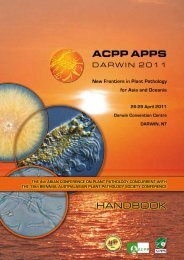
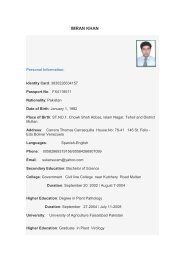

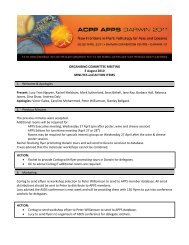
![[Compatibility Mode].pdf](https://img.yumpu.com/27318716/1/190x135/compatibility-modepdf.jpg?quality=85)
